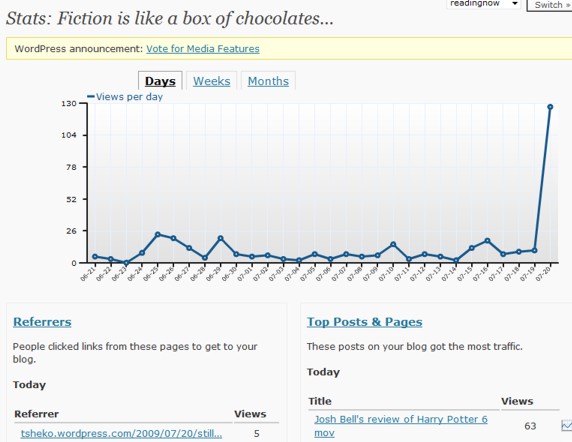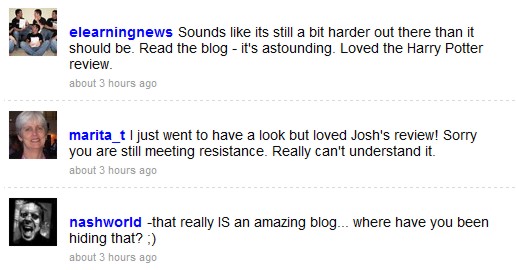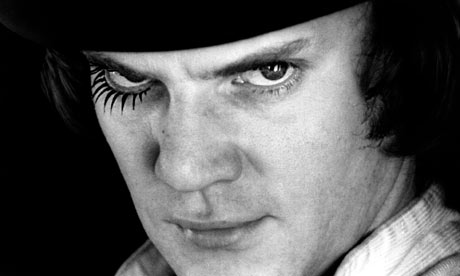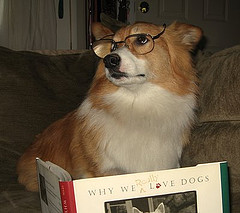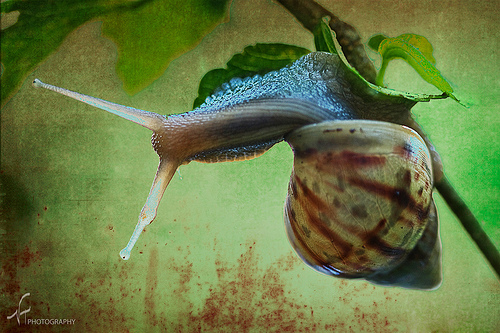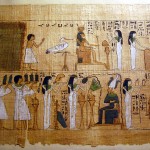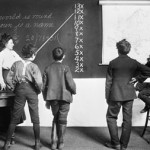[scribd id=4907297 key=key-10nxnctst7rgc6yw9e62]
This made me laugh. Some of my favourite Hamlet statuses:
Hamlet wonders if he should continue to exist. Or not.
Hamlet added England to the Places I’ve been application.
Ophelia loves flowers. Flowers, flowers, flowers. Oh look, a river.
I wonder if other versions exist. This could be a creative writing idea. You actually do need to know about the play to be able to write the statuses.

Photo courtesy of Sakypaky on Flickr
Our Head English teacher is using Facebook in the hope that it will allow boys who don’t usually contribute in class to have a voice in front of their peers. How do you explain to cynics your choice of Facebook as a platform for learning?
Adolescents have moved to Facebook for networking and communication. I’ve become a Facebook addict myself. One of its offerings is a non-threatening form of communication with a potentially large group. Another is the satisfaction of belonging to a group. It’s more accepting and democratic than face-to-face interaction – it doesn’t judge you by your appearance, age or abilities. You can choose your own hours. You can stand back and observe, or you can jump in and lend your voice.
Transfer all this to a learning environment, and you have a potentially brilliant scenario. Those who are slower to respond to discussion will not be pushed out. There’s time to think, respond, edit. The teacher can set the stage and then creep back to give control to the students. Hopefully, students will feel more comfortable to ask questions, give suggestions.
Those of you who’ve been reading my blog will know that I believe we should use technology and social media in creative ways to facilitate learning and engage students. Not for its own sake, and never without good reason. Recently my webpage on the school library intranet has evolved into a blog ‘What’s new in fiction?’ I’m so over people saying things like ‘Oooh, a blog! You’re really into all that technology stuff!. Well, no… I’m not. I’m not into it. I’m just looking at what possibilities it has for engaged and creative learning and teaching. Here is a list of things I appreciate about the fiction blog when talking to classes about books and reading:
It evolves nicely; each post introduces a new book, author, series, etc.
I can use casual, relaxed language, with even some humour
I can include pictures (book covers, author photos, etc.) and videos (book or film trailers, interviews, etc.)
Colour, font size, layout make a difference
I can include links to author and series websites, transcripts, extracts, maps, etc.
There is choice in what the students read, how much, when, etc. Compare that to a teacher’s talk;
Authors become real people as students link to interviews, blogs that reveal everyday chat or writing processes, weaknesses, personality, background, musical tastes, etc.
(OK, the above points are not unique to blogs)
Here come the blog-specific points:
The students read and write comments, ranging from the non-threatening two-word comment, to the more elaborate or passionate response;
Reading peer comments is more satisfying than listening to teachers’ views (hence Facebook idea);
Other people in the school community can write a post or book review, eg. non-librarians (leading the students to the realisation that it’s not just librarians who read, and that reading is ipso facto not solely a librarian’s past-time;
These other people could be students of all ages, teachers, teachers who wouldn’t normally be associated with reading by students (don’t take offense, but I’m thinking sport teachers, science and maths teachers, male teachers…)
The combination of different readers, each with their own reading preferences, their own way of writing, provides students with a kaleidoscopic view of what’s interesting to read;
Students take ownership of the blog by writing or commenting, by suggesting content, and the school community becomes involved in what was previously a librarian’s domain.
Reading is actually discussing, arguing, agreeing and disagreeing, thinking, wondering, escaping; and you know all this because of the discussion;
Reading becomes collective, cool, broader (you realise that tastes vary greatly and it’s okay to have your preferences; reading can be student-directed and even fun.
What I regret is that my fiction blog is a closed blog on the school intranet. It serves its purpose, but misses out on further possibilities and connections.
What are your views about using Web 2.0 tools like blogs and Facebook in teaching and learning?
